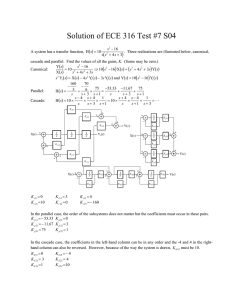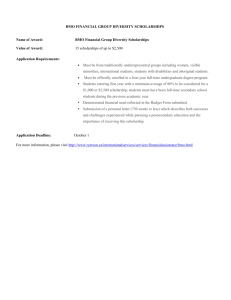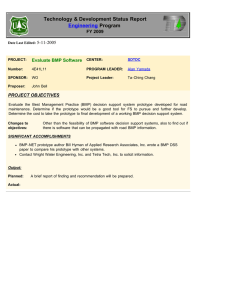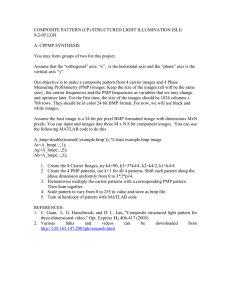Real-time Computer Simulation of Three Dimensional Elastostatics using the Finite Point Method
advertisement
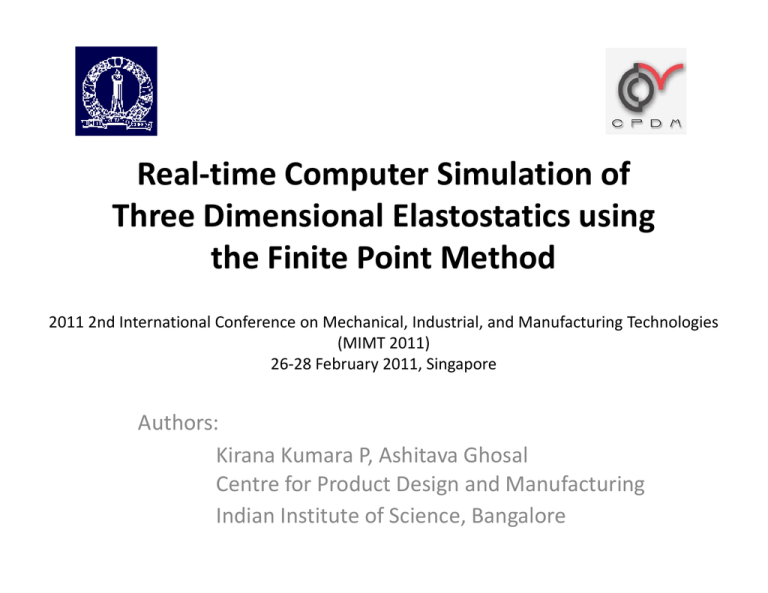
Real-time Computer Simulation of
Three Dimensional Elastostatics using
the Finite Point Method
2011 2nd International Conference on Mechanical, Industrial, and Manufacturing Technologies
(MIMT 2011)
26-28 February 2011, Singapore
Authors:
Kirana Kumara P, Ashitava Ghosal
Centre for Product Design and Manufacturing
Indian Institute of Science, Bangalore
Need for the Present Work
Real-time and realistic simulation of biological organs –
for surgical simulators
Use continuum mechanics based models for better
realism
Test the procedure on benchmark problems – beam, bar
Present Approach to Achieve the Speed
Needed for Real-time Performance
Use the simplified material behaviour – linear elastic
Use Finite Point Method (FPM)
Use a Graphics Processing Unit (GPU)
Governing Equations for Linear Elastostatics
∂ 2 u x ∂ 2 u y ∂ 2 u z
∂ 2u x ∂ 2u x ∂ 2u x
(λ + µ ) 2 +
+
+
=0
+ µ 2 +
2
2
∂x∂y ∂x∂z
∂y
∂z
∂x
∂x
∂ 2 u y ∂ 2 u x ∂ 2 u z
∂ 2 u y ∂ 2 u y ∂ 2 u y
(λ + µ ) 2 +
+
+
=0
+ µ 2 +
2
2
∂x∂y ∂y∂z
∂y
∂z
∂y
∂x
∂ 2 u z ∂ 2 u x ∂ 2 u y
∂ 2u z ∂ 2u z ∂ 2u z
(λ + µ ) 2 +
+
+
=0
+ µ 2 +
2
2
∂x∂z ∂y∂z
∂y
∂z
∂z
∂x
{σ } = [D ]{ε }
λ=
νE
(1 +ν )(1 − 2ν )
D11
D
12
D
[D ] = 12
µ =
D12
D12
D11
D12
D12
D11
E
2 (1 + ν )
(D11 − D12 ) / 2
(D11 − D12 ) / 2
(D11 − D12 ) / 2
D11 =
E (1 −ν )
(1 − 2ν )(1 +ν )
D12 =
Eν
(1 − 2ν )(1 +ν )
Finite Point Method (FPM)
(E. Onate, 2001, Computers and structures)
-----------(1)
----(2)
o In FPM, n>m and hence approximation cannot fit nodal values.
o This problem can be overcome by determining the u(x) values
by minimizing the sum of the square distances of the error at each
point weighted with a function φ(x) as
------(3)
Standard minimization of Eq (3) gives
-----(4)
-----(5)
Final approximation obtained by substituting α from Eq (4) into Eq
(1):
-----(6)
------(7)
Discretization of governing equations
-----(8)
------(9)
-----(10)
Substituting Eq (6) in Eq (8), Eq (9) and Eq (10) and collocating
the differential equation at each point in the analysis domain,
-------(11)
Sample Problem Description
A beam of length=99 mm and (4mmX4mm) cross section is
discritized by uniformly spaced nodes located 1mm apart.
Linear elastic material behaviour is assumed and strains and
displacements are assumed small. E=200000N/mm2 , ν=0.33
Results from FPM
Cantilever:
Theoretical formula: y=(-1/6)(F/EI)(x3 -3l2 x+2l3 ), x being measured from tip
Fixed at both ends:
Uniaxial tension:
Truncated exponential weight function is used as the weight
2
function:
2
2
exp( − r / c ) − exp( − r / c 2 )
w(r ) =
m
2
1 − exp( − rm / c 2 )
c = 0 . 25 rmax
r m = 2 r max
GPU (Images from www.nvidia.com)
Solution Strategy and Solution Times
(GPU used: NVIDIA GeForce GTX 460)
Time limit: 0.033 s
CPU
CPU alone (without GPU)
takes 0.066 s
{F}
GPU
0.030 s
Solve
{X} = {K}-1{F}
(0.020 s)
{X}
(MATLAB and GPUmat are used for obtaining the results)
Conclusions
• CPU alone > Real-time not possible
• Real-time graphical simulation possible with
GPU acceleration
References
[1] OPENHAPTICS™ TOOLKIT version 2.0, PROGRAMMER’S GUIDE,
SensAble technologies, 2005
[2] U. Meier, O. Lopez, C. Monserrat, M. C. Juan, M. Alcaniz, “Realtime deformable models for surgery simulation: a survey,”
Computer Methods and Programs in Biomedicine (2005) 77, 18397
[3] L S Srinath, Advanced Mechanics of Solids, Tata McGraw-Hill,
Third Edition, 2009
[4] Yi-Je Lim, Suvranu De, “Real time simulation of nonlinear tissue
response in virtual surgery using the point collocation-based
method of finite spheres,” Comput. Methods Appl. Mech. Engrg.
196 (2007) 3011–3024
[5] (2010) The MATLAB website. [Online]. Available:
http://www.mathworks.com/
[6] (2010) GPUmat: GPU toolbox for MATLAB. [Online]. Available:
http://gp-you.org/
[7] An Introduction to Meshfree Methods and Their Programming,
G R Liu and Y T Gu, Springer,2005
[8] Meshfree and particle methods and their applications, Shaofan Li
and Wing Kam Liu, Appl Mech Rev vol 55, no 1, January 2002
[9] A finite point method for elasticity problems, E. Onate, F. Perazzo,
J. Miquel, Computers and Structures 79(2001) 2151-2163
[10] Modelling of soft tissue deformation for laparoscopic surgery
simulation, G. Szekely, Ch. Brechbuhler, R. Hutter, A. Rhomberg,
N. Ironmonger, P. Schmid, Medical Image Analysis 4 (2000) 57–66
Thank You!
